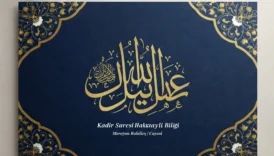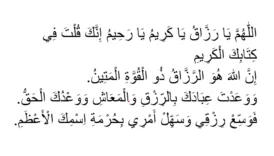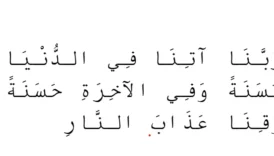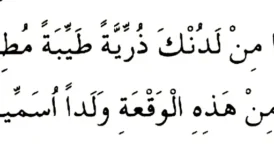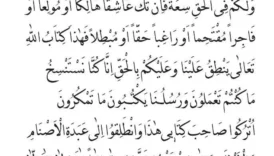Effective Supplications, Dhikr, and Advice for Reducing Lust
Islamic Prayers | Human beings are inherently equipped with various emotions. Alongside feelings like joy, sadness, anger, and fear, sexual desire, or lust (shahwah), which is part of life and the continuation of generations, is also a reality of our innate nature (fitrah). Islam does not ignore this feeling; on the contrary, while encouraging it to be experienced within permissible (halal) boundaries, it warns the believer against its uncontrolled dimension that leads to the forbidden (haram) and guides them. Gaining control over lust is a significant step in the journey of disciplining the self (nafs), and seeking spiritual support in this process is inevitable. Dhikr (remembrance of Allah), dua (supplication), and steps taken in the light of Islamic teachings are our greatest aids in this challenging yet valuable struggle.
- Effective Supplications, Dhikr, and Advice for Reducing Lust
- The Human Self (Nafs) and the Feeling of Lust
- The Role of Dhikr and Dua in Lust Control
- A Recommended Dua and Dhikr for Reducing Lust
- Other Spiritual and Practical Methods for Controlling Lust
- The Effect of Diet on Lust: The Citron Narration
- Final Word
The Human Self (Nafs) and the Feeling of Lust
In Islamic thought, the “nafs” is considered the source of desires, wants, and impulses within the human inner world. The nafs has different levels, and its lowest level, “nafs al-ammārah,” constantly commands evil and excess. When the feeling of lust is uncontrolled, influenced by this commanding aspect of the nafs, it can lead a person towards the forbidden. However, Islam does not aim to completely eradicate the nafs but to discipline it, elevating it to the level of “nafs al-muṭma’innah”—the soul at peace, finding satisfaction in the remembrance of Allah. Managing the feeling of lust correctly is critically important in this disciplinary process.
Lust, in its essence, is an energy bestowed upon humans by Allah. This energy, within the bond of marriage, leads to a legitimate and loving union and the continuation of lineage. However, when this energy is left uncontrolled or directed towards forbidden paths, it can cause numerous problems at both individual and societal levels. Uncontrolled lust underlies many negativities, from the zina (unlawful sexual intercourse) of the eyes to actual zina, violation of privacy, and moral decay. Therefore, Islam teaches believers ways to manage this feeling through both spiritual and practical measures.
The Role of Dhikr and Dua in Lust Control
Dhikr literally means “to remember, to recall.” In Islamic terminology, it means remembering Allah, glorifying Him with His names and attributes, thanking Him, and seeking His help. Dhikr enables the heart to turn towards Allah and establish a connection with Him. As the heart remembers Allah, the influence of worldly and carnal desires diminishes, and a state of spiritual peace and tranquility emerges. In dealing with a powerful emotion like lust, dhikr is a spiritual shield that strengthens the heart, fortifies the will, and places the person under Allah’s protection.
Dua, on the other hand, is the servant’s turning to their Lord, acknowledging their helplessness, asking from Him, and seeking refuge in Him. When the pressure of lust increases and the will feels weakened, making dua and asking for Allah’s help is one of the most effective ways. When the servant sincerely turns to their Lord, presents their situation, and asks for His help, Allah’s mercy and assistance reach them. Dhikr and dua are two complementary spiritual weapons; dhikr purifies and strengthens the heart, while dua directly opens the door to seeking help from Allah.
A Recommended Dua and Dhikr for Reducing Lust
In moments when a person struggles and feels overwhelmed by carnal desires, the safest refuge is Allah Almighty. In narrations and the advice of scholars, there are supplications recommended especially when controlling the feeling of lust becomes difficult. One of these is the dua that Prophet Muhammad (peace be upon him) taught his daughter Fatimah (may Allah be pleased with her) and recommended reciting during times of distress:
Arabic Script:
بِسْمِ اللهِ الرَّحْمَنِ الرَّحِيمِ
يَا حَيُّ يَا قَيُّومُ بِرَحْمَتِكَ أَسْتَغِيثُ، أَصْلِحْ لِي شَأْنِي كُلَّهُ، وَلَا تَكِلْنِي إِلَى نَفْسِي طَرْفَةَ عَيْنٍ
Transliteration:
Bismillāhir-raḥmānir-raḥīm.
Yā Ḥayyu yā Qayyūmu biraḥmatika astaghīth, aṣliḥ lī sha’nī kullahū, wa lā takilnī ilā nafsī ṭarfata ʿayn.
Meaning:
In the name of Allah, the Most Gracious, the Most Merciful.
O Ever-Living, O Self-Sustaining Sustainer! By Your mercy I seek assistance. Rectify for me all my affairs and do not leave me to myself, even for the blink of an eye.
This dua involves seeking help through Allah’s mercy by invoking His names al-Ḥayy (The Ever-Living) and al-Qayyūm (The Self-Sustaining Sustainer). Following this, one asks Allah to rectify all affairs and conditions, with the most critical point being the plea “do not leave me to myself, even for the blink of an eye.” This reflects a deep awareness of human helplessness and the danger of the nafs. Seeking refuge in this dua during moments when lust becomes overwhelming and the will weakens means asking Allah to take control and protect one from the traps of the nafs. The recommendation to recite it 18 times a day is likely a practice aimed at increasing the dua’s effectiveness; what is important is consistency and sincerity in reciting it. Hadiths narrated by Anas ibn Malik (may Allah be pleased with him) are cited as the source for this dua (Tirmidhī, Daʿawāt, 91; Ḥākim, al-Mustadrak, I, 730).
Other Spiritual and Practical Methods for Controlling Lust
Besides dhikr and dua, Islam suggests other methods for controlling lust and disciplining the nafs:
- Lowering the Gaze: The Quran commands: “Tell the believing men to reduce [some] of their vision and guard their private parts… And tell the believing women to reduce [some] of their vision and guard their private parts…” (Surah An-Nur, 24:30-31). Controlling the gaze, avoiding looking at the forbidden, and staying away from elements that provoke lust are cornerstones of this struggle. The eyes are like windows to the heart; a window looking at the forbidden sows seeds of fitnah (trial, temptation) in the heart.Surah An-Nur, Verse 30:Arabic Script:قُل لِّلْمُؤْمِنِينَ يَغُضُّوا مِنْ أَبْصَارِهِمْ وَيَحْفَظُوا فُرُوجَهُمْ ذَلِكَ أَزْكَى لَهُمْ إِنَّ اللَّهَ خَبِيرٌ بِمَا يَصْنَعُونَTransliteration:Qul lilmu’minīna yaghuḍḍū min abṣārihim wa yaḥfaẓū furūjahum, dhālika azkā lahum, innallāha khabīrun bimā yaṣnaʿūn.Meaning:Tell the believing men to reduce [some] of their vision and guard their private parts. That is purer for them. Indeed, Allah is Acquainted with what they do.
- Fasting: Prophet Muhammad (peace be upon him) recommended fasting, especially for young people unable to marry. He said: “O young people! Whoever among you can afford to marry should marry, for it is more effective in lowering the gaze and guarding one’s chastity. Whoever cannot afford to marry should fast, for fasting will diminish his sexual desire.” (Bukhārī, Ṣawm, 10; Muslim, Nikāḥ, 1, 3). Fasting is an act of worship that restrains not only the stomach but also carnal desires. Hunger and thirst weaken bodily urges and facilitate turning towards spirituality.
- Avoiding Idle and Vain Pursuits: It is important to stay away from environments, conversations, and media that could lead to the forbidden. Occupying the mind and heart with beneficial knowledge, performing righteous deeds, and engaging in good activities prevent the nafs from turning towards evil desires. Idle time is when Satan and the nafs most easily lay their traps.
- Seeking Righteous Companionship: A person follows the religion of their friend. Being with good and righteous people encourages one towards good and prevents evil. Bad companions, however, can unknowingly lead a person towards the forbidden and sin. Therefore, choosing one’s company plays a vital role in self-discipline.
- Remembering Death and Accountability: Reflecting on the transient nature of this world, the certainty of death, and the fact that every deed will be accounted for in the Hereafter is an effective method for controlling carnal desires. This contemplation motivates a person to adhere more strictly to Allah’s commands and avoid His prohibitions.
- Living Within Halal Boundaries: Islam does not deny natural needs but commands that they be met through lawful means. Marriage is a sacred institution where the sexual need is met legitimately and lawfully, forming the foundation of love, respect, and tranquility. Fulfilling this responsibility, for those who are able, protects both the individual and society from zina and immorality.
The Effect of Diet on Lust: The Citron Narration
Regarding the narration mentioned in the original text that “a person addicted to zina who continuously eats citron (a thick-rinded citrus fruit) will see their condition improve,” it is important to investigate the source and authenticity of such information. Traditional medicine or folk beliefs may contain information about certain foods affecting certain emotions or conditions. There might be views that citron or similar plants have calming effects or regulate certain bodily functions. However, finding definitive proof that this specific information comes directly from authentic hadith sources or reliable Quranic commentaries is difficult. Such narrations are often based on experience or weak sources. It is a known fact that diet affects general health and, consequently, emotional states. Overeating, especially consuming stimulating or heavy foods, can trigger carnal desires. A balanced and halal diet helps maintain physical and spiritual health. Therefore, rather than making a definitive statement specifically about citron, it is more accurate to say that generally, a healthy, balanced diet and avoiding excess contribute to self-discipline.
Final Word
The feeling of lust is part of the human test. Struggling with this feeling requires patience, willpower, and, most importantly, constantly seeking help from Allah. Dhikr and dua are the most potent spiritual weapons in this struggle. Keeping the heart occupied with the remembrance of Allah, seeking refuge in Him, lowering the gaze, fasting, seeking righteous company, and striving to stay within halal boundaries are fundamental ways to protect oneself from the dangers of the nafs and control lust. It should be remembered that this effort not only provides worldly relief but is also a valuable act of worship in the sight of Allah and a means of drawing closer to Him. We ask Allah to help us all on this path and keep our feet firm.
Bibliography
- The Holy Quran, Surah An-Nur.
- al-Bukhārī, Muḥammad ibn Ismāʿīl. Ṣaḥīḥ al-Bukhārī. Riyadh: Darussalam, 1997. (Relevant Hadiths: Ṣawm 10)
- Muslim ibn al-Ḥajjāj. Ṣaḥīḥ Muslim. Riyadh: Darussalam, 2000. (Relevant Hadiths: Nikāḥ 1, 3)
- al-Tirmidhī, Abū ʿĪsā Muḥammad ibn ʿĪsā. Sunan al-Tirmidhī. Beirut: Dār Iḥyāʾ al-Turāth al-ʿArabī, n.d. (Relevant Hadiths: Daʿawāt 91)
- al-Ḥākim al-Naysābūrī, Abū ʿAbd Allāh Muḥammad ibn ʿAbd Allāh. al-Mustadrak ʿalā al-Ṣaḥīḥayn. Beirut: Dār al-Kutub al-ʿIlmiyyah, 1990. (Relevant Section: I, 730)
- al-Ghazālī, Abū Ḥāmid Muḥammad ibn Muḥammad. Iḥyāʾ ʿUlūm al-Dīn (The Revival of the Religious Sciences). Cairo: Dār al-Shaʿb, n.d. (Especially sections related to Disciplining the Soul and Actions of the Heart).
